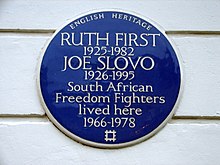Joe Slovo
He became known for proposing the "sunset clauses" covering the 5 years following a democratic election, including guarantees and concessions to all sides,[1] and his fierce non-racialist stance.
[7] In 1950, the SACP was banned and both First and Slovo were listed as communists under the Suppression of Communism Act and could not be quoted or attend public gatherings in South Africa.
In the 1970s he wrote the influential essay "South Africa: No Middle Road", which argued that the apartheid government would be unable to achieve stability, co-opt significant sections of the small but growing black middle class, or democratise: the only choice was between an insurrectionary overthrow of apartheid, centred on MK, or even greater repression.
[10] At the time the SACP's orthodox pro-Soviet and two-stage view of change in South Africa – "national democratic revolution" first, socialism later – was dominant in the ANC-led liberation movement.
Slovo insisted on having a "justified confidence in the future of socialism and its inherent moral superiority", and pointing to "the failures of capitalism", although he now rejected the one-party state model.
Slovo was a long-demonised figure in white South African society, widely misrepresented as a KGB colonel or Russian secret agent, and attracted a great deal of press after his return.
[14] In 1992, Slovo secured a major breakthrough in the negotiations to end apartheid in South Africa by presenting the "sunset clauses" developed by the ANC/ SACP leadership: a coalition government for five years following democratic elections, guarantees for civil servants, including the homelands and armed forces, and an amnesty process.
However, Slovo specifically rejected any compromise on full majority rule, and any agreement that "constitutionally prevented permanently" a new government "from effectively intervening to advance the process of redressing the racially accumulated imbalances in all spheres of life".
[15] Slovo was a harsh critic of Israel, which he viewed as an apartheid state, and has been described among "people who want to see justice in struggles wherever they are fought".
His funeral was attended by the entire high command of the ANC, and by most of the highest officials in the country, including both Nelson Mandela and Thabo Mbeki, and he was buried in Avalon Cemetery, Soweto, which was unheard of for a white South African.
[18] A newly constructed Residence building at Rhodes University in Grahamstown, South Africa, has been named "Joe Slovo" in honour of the man.
[21] Slovo was widely admired across southern Africa, leading Zimbabwean magazine, Southern African Political and Economic Monthly running a special issue on his death, and describing Slovo in an obituary as a "liberation war hero" and "African patriot" completely immersed in the struggle for black freedom.

